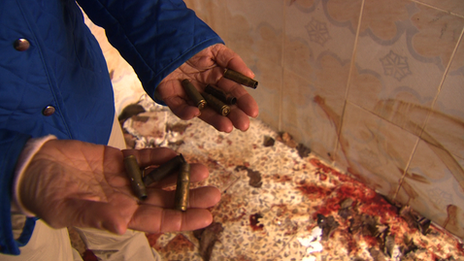Syria crisis: BBC sees evidence of Homs massacre
- Published
Lyse Doucet: "A war crime happened here". This video contains graphic images
The BBC has found evidence to support reports from Syria of a massacre this week in which at least 100 people were killed and burned in their homes.
A team visited the village of Haswiya, on the edge of the central city of Homs, and saw charred bodies still lying inside one of the houses.
Government soldiers said all the bodies had been taken away and blamed Islamist militants fighting with the rebels.
But one villager told the BBC the army was present at the time of the deaths.
In a separate development, reports emerged of the deaths of two journalists covering the conflict in Syria.
Al-Jazeera TV reporter Mohammed Hourani was shot dead in the southern province of Deraa, the network said. The pan-Arab channel said Hourani, 33, had been hit by "a regime sniper".
The day before, a French journalist was shot dead in the northern city of Aleppo, opposition activists said.
The Aleppo Media Centre also blamed a sniper for killing the journalist, Yves Debay, although one activist said it was not clear who was behind his death.
Photographs of Debay's body and of his press card were posted online.
Meanwhile, a rocket hit a building in another district of Aleppo. State media blamed "terrorists", but activists said it was an air strike.
There were also two car bombings in the southern city of Deraa.
'Smeared with blood'
Reports of a massacre at Haswiya emerged on Thursday from opposition and human rights activists, but they could not be verified immediately.
The Syrian Observatory for Human Rights (SOHR) said women and children had been among 106 people killed by forces loyal to President Bashar al-Assad.
Some of the dead were "burnt inside their homes while others were killed with knives" and other weapons, the UK-based activist group said. It added that there were reports that "whole families were executed, one of them made up of 32 members."
"This needs to be investigated by the United Nations," said Rami Abdul Rahman, director of the UK-based activist group.
However, a government official in Damascus denied reports of a massacre.
On Friday, the BBC's Lyse Doucet was able to travel to Haswiya.
When she arrived, Syrian army soldiers told her that all the bodies had already been taken away, but our correspondent found the scene of a vicious murder.
"Three charred bodies lay sprawled just inside one house. A trail of blood stained the cement," she reported. "In the kitchen, where china teacups sat neatly on a shelf, more than a dozen bullet casings were scattered across a floor smeared with blood.
"In another room, two more burnt corpses were curled up next to a broken bed."

The BBC team were shown dozens of bullet casings in a Haswiya home
Villagers, still visibly shocked, told the BBC that at least 100 people were killed that day.
Soldiers who escorted the team to the area said hundreds of men from a militant Islamist rebel group, the al-Nusra Front, committed the killings.
One woman told the BBC the same. But out of earshot of the official Syrian minders, another woman said the army was present at the time and that some soldiers even apologised for the murders, saying others had acted without orders.
The SOHR said all of the dead appeared to be Sunni Muslims, who make up a majority of the population and have been at the forefront of the revolt against the state during the 22-month conflict that the UN says has left more than 60,000 people dead.
The area around Haswiya witnessed clashes earlier this week between government forces and rebels. The pro-government newspaper al-Watan said troops had advanced in the countryside around Homs, "cleansing the villages of Haswiya and Dweir, as well as their fields" of gunmen.